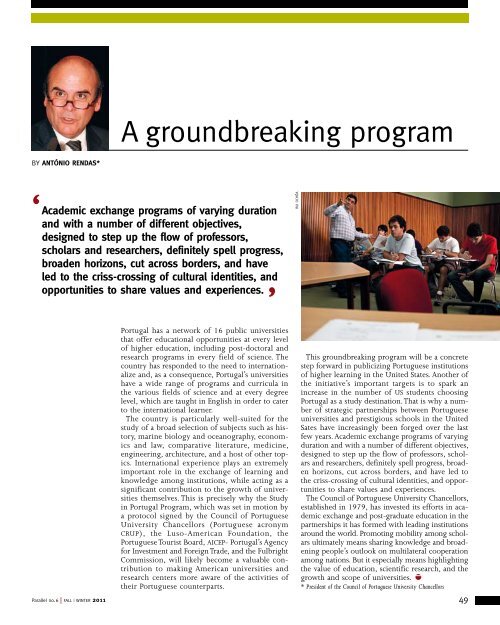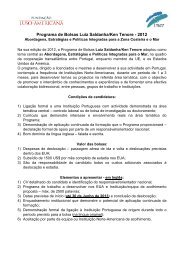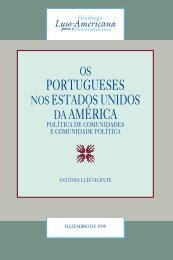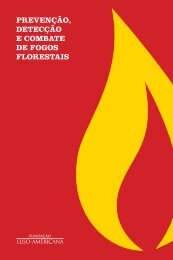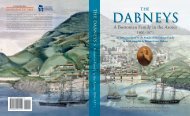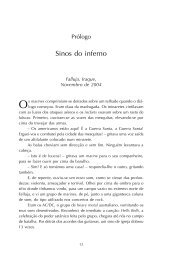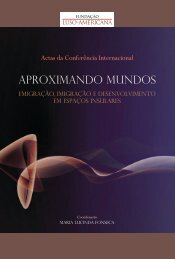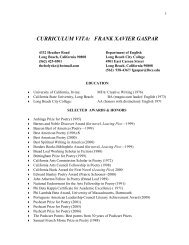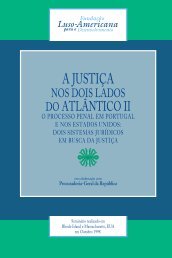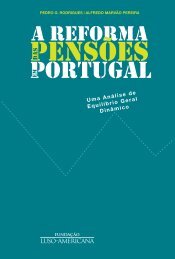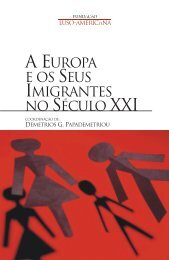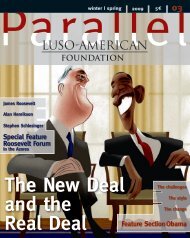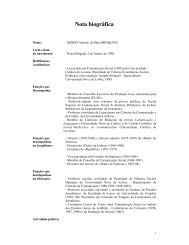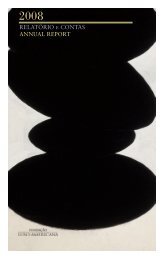A decade later - Fundação Luso-Americana
A decade later - Fundação Luso-Americana
A decade later - Fundação Luso-Americana
Create successful ePaper yourself
Turn your PDF publications into a flip-book with our unique Google optimized e-Paper software.
By AnTónio rendAs*<br />
A groundbreaking program<br />
‘ Academic exchange programs of varying duration<br />
and with a number of different objectives,<br />
designed to step up the flow of professors,<br />
scholars and researchers, definitely spell progress,<br />
broaden horizons, cut across borders, and have<br />
led to the criss-crossing of cultural identities, and<br />
opportunities to share values and experiences.<br />
’<br />
Portugal has a network of 16 public universities<br />
that offer educational opportunities at every level<br />
of higher education, including post-doctoral and<br />
research programs in every field of science. The<br />
country has responded to the need to internationalize<br />
and, as a consequence, Portugal’s universities<br />
have a wide range of programs and curricula in<br />
the various fields of science and at every degree<br />
level, which are taught in English in order to cater<br />
to the international learner.<br />
The country is particularly well-suited for the<br />
study of a broad selection of subjects such as history,<br />
marine biology and oceanography, economics<br />
and law, comparative literature, medicine,<br />
engineering, architecture, and a host of other topics.<br />
International experience plays an extremely<br />
important role in the exchange of learning and<br />
knowledge among institutions, while acting as a<br />
significant contribution to the growth of universities<br />
themselves. This is precisely why the Study<br />
in Portugal Program, which was set in motion by<br />
a protocol signed by the Council of Portuguese<br />
University Chancellors (Portuguese acronym<br />
CRUP), the <strong>Luso</strong>-American Foundation, the<br />
Portuguese Tourist Board, AICEP- Portugal’s Agency<br />
for Investment and Foreign Trade, and the Fulbright<br />
Commission, will likely become a valuable contribution<br />
to making American universities and<br />
research centers more aware of the activities of<br />
their Portuguese counterparts.<br />
This groundbreaking program will be a concrete<br />
step forward in publicizing Portuguese institutions<br />
of higher learning in the United States. Another of<br />
the initiative’s important targets is to spark an<br />
increase in the number of US students choosing<br />
Portugal as a study destination. That is why a number<br />
of strategic partnerships between Portuguese<br />
universities and prestigious schools in the United<br />
Sates have increasingly been forged over the last<br />
few years. Academic exchange programs of varying<br />
duration and with a number of different objectives,<br />
designed to step up the flow of professors, scholars<br />
and researchers, definitely spell progress, broaden<br />
horizons, cut across borders, and have led to<br />
the criss-crossing of cultural identities, and opportunities<br />
to share values and experiences.<br />
The Council of Portuguese University Chancellors,<br />
established in 1979, has invested its efforts in academic<br />
exchange and post-graduate education in the<br />
partnerships it has formed with leading institutions<br />
around the world. Promoting mobility among scholars<br />
ultimately means sharing knowledge and broadening<br />
people’s outlook on multi<strong>later</strong>al cooperation<br />
among nations. But it especially means highlighting<br />
the value of education, scientific research, and the<br />
growth and scope of universities.<br />
* President of the Council of Portuguese University Chancellors<br />
Parallel no. 6 | FALL | WINTER 2011 49<br />
RUI OChÔA


